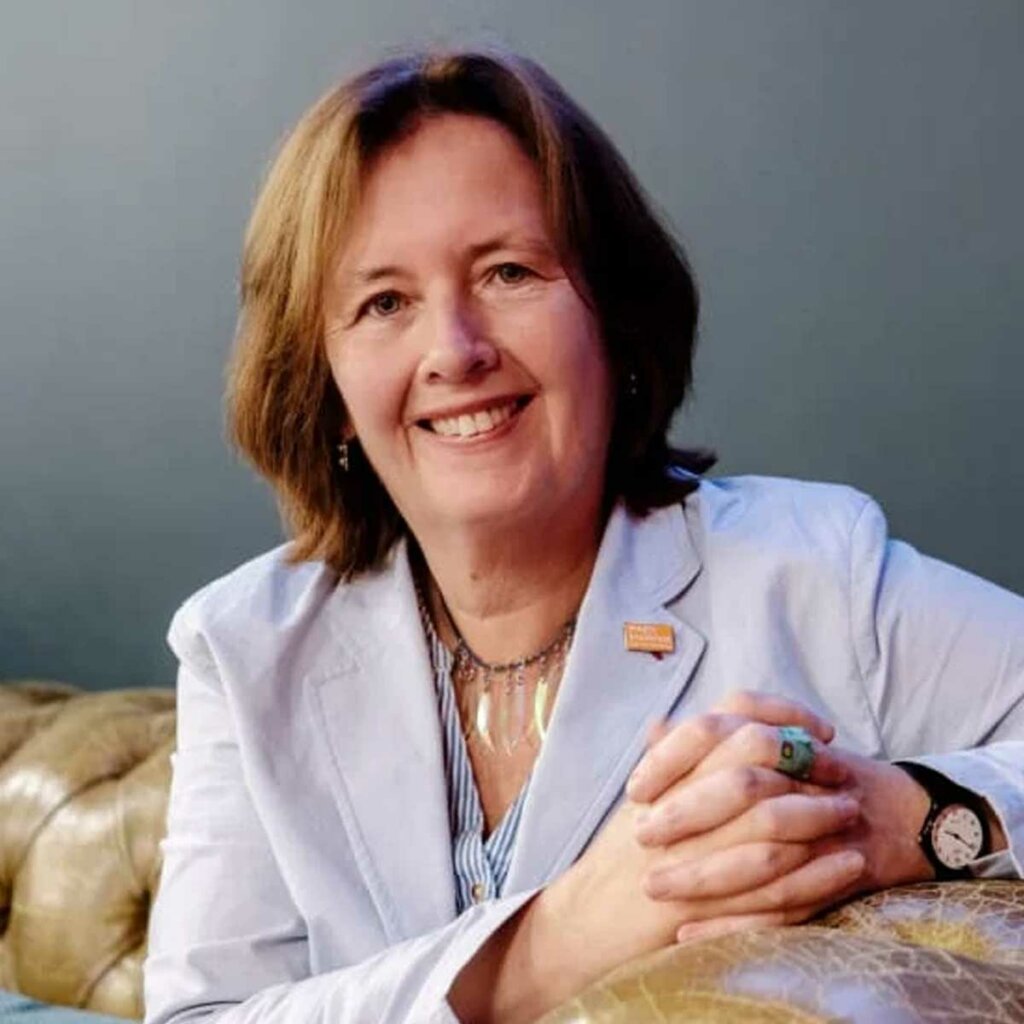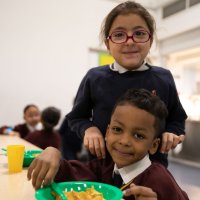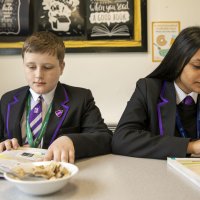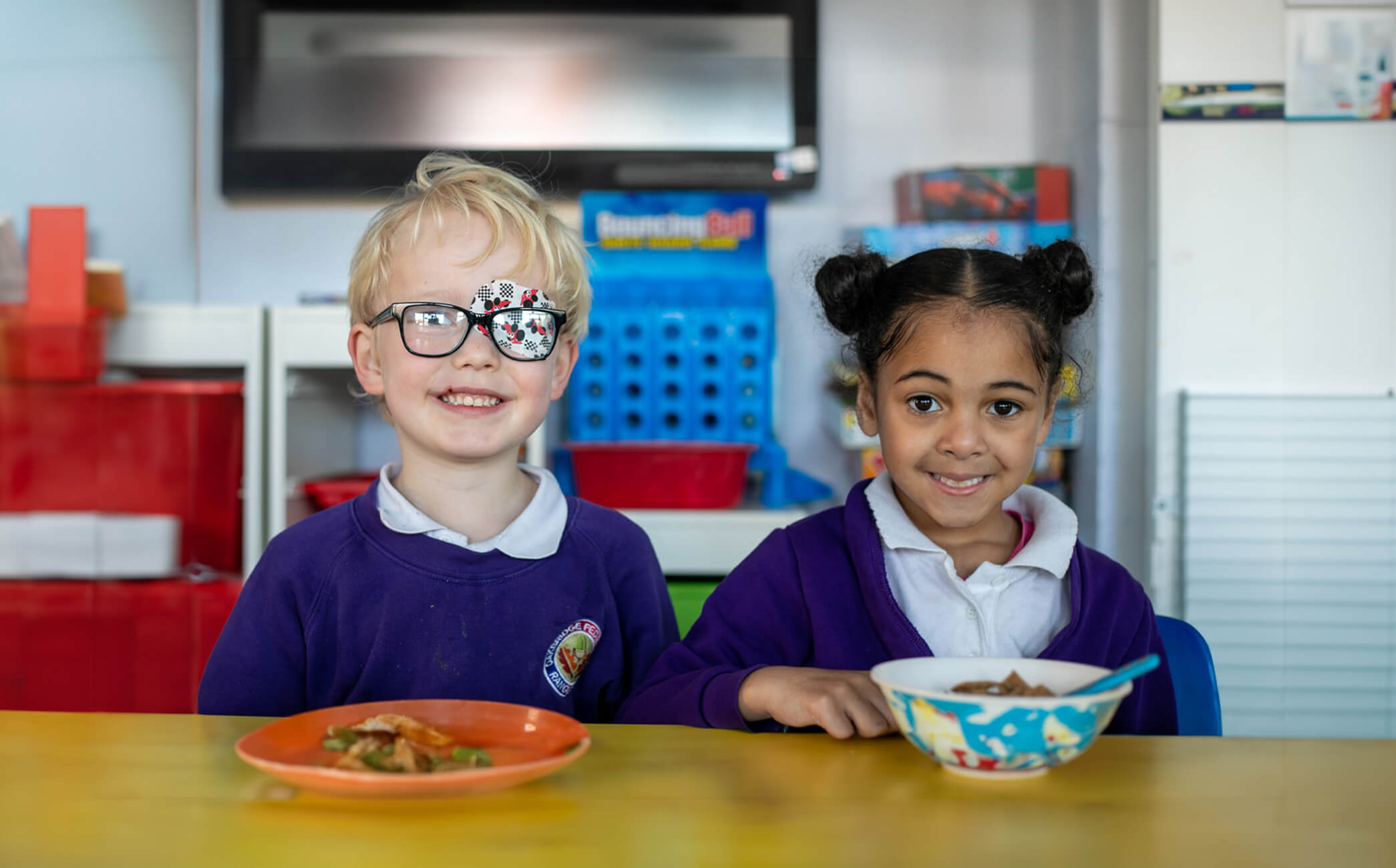
We speak to our Founder, Carmel McConnell MBE, about what drove her to start Magic Breakfast, her passion, vision, and what she believes to be the solution to child morning hunger.
Can you tell us a little about your background and professional history?
My family are from Fermanagh in Northern Ireland and I grew up in Dagenham. My mum often used to invite children into our house for beans on toast after school. I remember watching them eating with urgency. My mum used to say they didn’t have enough at home to keep them going. That stayed with me.
I left school at 15, optimistic and more interested in music than almost anything else. My 20s were a mixture of anti-nuclear and anti-racism campaigns and technology jobs. Fast forward many years to my running an ethical tech change business in the City of London. Less than two miles away from my office, teachers were dealing with child hunger at almost Dickensian levels.
How and why did Magic Breakfast begin, and what were the early days like?
Twenty years ago, I interviewed five headteachers in East London for my first book, Change Activist. The book suggested using the ideas of social activism to create ethical change in the business community. Those Headteachers told me children are coming in so hungry “we all have to bring in food everyday just to be able to teach”. So, shocked, I offered to drop off food to them. Then I went home and cried my eyes out.
I began buying food at Tesco on Saturday mornings, dropping off bags of cereal, bagels, and bread to the schools. I just wanted to show some love to children who were arriving at school too hungry to learn.
As word spread 25 schools asked for help and, as demand for help grew, I re-mortgaged my house, took a one-year sabbatical (or so I thought!) from work. My book became a business best seller, and I donated all profits to the effort of providing school breakfasts. My lovely publishers, Pearson, donated too.
I had no experience in running a charity but my business background was helpful, being able to translate child hunger into a purposeful CSR commitment for businesses. That’s how the charity grew. Pearson were incredibly supportive too, they were our rock and helped enable the charity to expand.
In the first eight years, there were no full time staff, no salaries, and donations were entirely spent on getting food to children. We created the brand, built a website, Elie Williams from Pearson helped as project manager. I recruited some great trustees, and found pro bono financial and accounting support. I used to deliver the food to schools myself, then we used couriers, then Sainsbury’s home deliveries.
Back in 2004 we were based in a big Georgian house in Covent Garden, once owned by the Brontes. It was owned by Pearson, I asked if we could use it rent free while it was awaiting refurbishment. I’m sure it was haunted. Some days when we stayed late to work the doors blew open and shut, all on their own. It certainly added to the vibe.
The charity was really creative – everyone felt it was a social change start up rather than anything else. The focus was 100% on delivering healthy breakfasts as ‘fuel for learning’ and our first mantra was “no child too hungry to learn”.
How did you feel when you started getting such positive feedback from that first cohort of schools?
It was great – but heart-breaking too, realising so many hungry children were missing out on their learning every single day. I cried after every school visit. Children waking up in homes with no food. Parents telling me they were missing meals to give their children something to eat. How could anyone ignore that?
My action was, and is, from love and respect for each child, to stop their hunger being a barrier to education at the start of the school day. It is simply wrong. All the extra things teachers reported – improved attendance, punctuality, concentration, behaviour – were wonderful extras. They enabled me to make the case for support to people who didn’t immediately jump on board to help.
What was your motivation for starting the charity?
Knowing children were climbing into supermarket bins before school, looking for food. Wanting them to have a chance and some dignity in their childhood. That in the 5th richest economy in the world no child should be too hungry to learn.
What was your vision?
That every family be able to put good food on the table. And until that day, when we decide on a more equal, fair society, to make sure hungry children receive a good school breakfast, lunch plus holiday food. Every child at risk of hunger must be looked after with a free, healthy school breakfast, served with love. With no price barrier or stigma.
The passion, purpose and plan I put in place for Magic Breakfast was all based on change activist thinking, to help everyone find their own version of Greta Thunberg or Marcus Rashford. That anyone can make a difference!
How did you grow the charity from a handful of schools in London to hundreds of schools nationwide?
Back then, people didn’t know there were so many hungry children. I didn’t at the start. So my job was to build awareness, in a loving, non-judgmental way, and just get as much good food as I could in front of those children.
My idea was to map hunger, create awareness and build funds and national will to get those children fed as quickly as possible.
Because of my experience as a social activist and campaigner and success in business, I was able to speak to a wide audience and orchestrate compassion, raise money, food, all sorts of free support, and help create a new national school breakfast service – the first one ever. My goal was to reach half a million children everyday – that was the minimum need. I focused on one child at a time, raising money by saying “the cost of one Starbucks gives a child fuel for learning every morning for a month”.
The charity goal was to keep costs low and make sure as much of every pound donated went on food and delivery. I wanted to build a charity totally focused on the child.
In addition to support and donations from the public, negotiating deals for corporate support was integral to our growth. Pearson were the first to support us, then Quaker, Tropicana, Morgan Stanley, the Mayors Fund, People’s Postcode Lottery, Amazon and Heinz all followed – plus many others!
In 2008 Alex Cunningham (who later went on to become CEO) joined the charity, he was an absolute hero and sorted out the supply chain, got financial systems in place and worked with funders. He worked night and day to get the charity to a place where we could win tenders, allowing us to grow the numbers of children being reached – he created a great legacy which will stand forever.
I am grateful to all kind supporters, the fantastic team and for all the kindness that meant I could pour my love and life force into these children for so long.
How did you land on the name ‘Magic Breakfast’?
My initial idea was to provide egg sandwiches for children before their first lesson, so ‘Magic Sandwich’ was the name of the initiative until the end of 2002.
Then, one of the lovely children said: “Miss, when I have a bagel and my milk, my brain wakes up. It’s like magic”. So, I changed the name to Magic Breakfast.
What was the biggest challenge you had to overcome in those early years?
The number one challenge was that no one believed children were hungry. At the start there was no Marcus Rashford!
Everyone asked the question “why can’t the parents feed their own children?” – people thought that parents could afford breakfast but instead spent their money on “Sky Sports and cigarettes”. So I had a lot of work to do to stop the blaming of low-income families. I spent a decade building awareness of the issue and kept repeating teacher stories of families working long hours, yet still unable to put food on the table. I remember saying in interview after interview, “it isn’t the child’s fault though, is it”.
What is your proudest achievement at Magic Breakfast?
There have been a few! Getting school breakfasts onto the national radar, and into the Government School Food Plan 17 actions. That took 10 years to achieve. The School Food Plan came from an independent review of school food in England by the co-founders of the Leon chain of restaurants, Henry Dimbleby and John Vincent. I was a member of the expert panel, making the case for disadvantaged children to have school breakfasts, plus universal infant free school meals and holiday provision.
Winning the Department for Education’s Lot 3 Tender, to set up new breakfast clubs in 184 schools in areas of social deprivation, which we won even though we needed to match fund £1.1 million in less than a month. Alex and the team delivered that DfE tender brilliantly, including helping to facilitate independent research, funded by the Education Endowment Foundation and carried out by the Institute for Fiscal Studies, which found that primary schools that offer Year 2 pupils a free, nutritious meal before lessons can boost their reading, writing and maths results by an average of two months’ progress over the course of a year.
Has there been one moment that stands out from the past 20 years?
There are three that stand out:
Winning a tender worth £26 million from the DfE. Creating the National School Breakfast programme with Family Action, which at its peak reached over 375,000 vulnerable schoolchildren.
I received an honorary doctorate from the Open University for opening up access to education. After the ceremony a woman came up and gave me a hug, she said she’d been a Magic Breakfast pupil and now getting her degree after 6 years of study and working full time. She said “my mum didn’t have enough money to feed us, but I was able to do ok at school because you gave me a bowl of porridge and a bagel every morning. Now my daughter is a Magic Breakfast pupil, so thank you Carmel.” Yep, I cried!
Receiving my MBE from HRH Prince Charles in 2016 was a proud moment too. I told everyone it should stand for ‘Magic Breakfast Expansion’.
Did you ever think Magic Breakfast would still be operating 20 years later?
No, it should never have been needed in the first place. A charity shouldn’t have to provide school breakfasts for hungry children, should it? My goal was always to make Magic Breakfast a past tense campaign, get permanent funding from Government and business, to make sure every child can learn. The goal of Magic Breakfast has always been to solve the problem of morning classroom hunger for good.
Why is it so crucial we put a stop to child hunger?
Because we can. Because it is morally wrong for some children to miss out on their precious education because they are born into a low-income home. Because each child has unique talent and just one chance at childhood. Because we are better than allowing child hunger to grow. I wanted to be a catalyst, to build massive support for these children. To make it unacceptable to have child classroom hunger at all. To boost the future life-chances of every child, through education access.
What do you see as the solution to ending child morning hunger?
Political action, legislation, driven by a public clamouring for justice. Plus an ongoing contribution from the food industry. Alongside solutions to ensure well-paid work and fair employment, so parents can afford to put good food on the table. With skills investment, this is entirely possible, so let’s create that reality.
What are your hopes for children living with food insecurity in the UK?
That we stop them being food insecure. That this rich caring country prioritises them. That they have breakfast, lunch and food in the holidays. That Sir Kevan Collins puts school breakfasts, using the Magic Breakfast model, into his education recovery plan. That all political parties say, yes to fuel for learning for vulnerable children, i.e. healthy school breakfast, lunch, holiday food in England, Scotland, Wales and Northern Ireland.
What changes would you like to see across industry/government/charity sector to leverage positive change?
I’d like to see Magic Breakfast scaled up and expanded, to build on what the charity has already achieved. The model needs to be funded to reach every hungry child, with permanent Government commitment, equivalent to school lunches. The Magic Breakfast model has been tested at scale through the NSBP, delivering so many benefits for the school and the child – so it must now be a central part of pandemic education recovery.
In my humble view, school breakfasts are about the best and most overlooked investment this country can make for every child now, and in the future.




